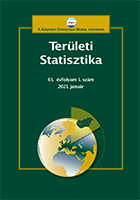Mobilitás és perzisztencia a hazai települési szintű jövedelemegyenlőtlenségi folyamatokban, 2012–2019
Mobility and persistence in income inequality processes at the domestic settlement level, 2012–2019
Author(s): Zoltán EgriSubject(s): Social Sciences, Economy, Geography, Regional studies
Published by: Központi Statisztikai Hivatal
Keywords: income inequality; development clubs; spatial econometrics; Markov chain
Summary/Abstract: The study aims to describe the general and settlement-level income inequality processes of the recovery period following the economic crisis of 2008–2009. The author describes in the introduction, the main analytical framework and the substantive inequality in Hungary, and presents the hypotheses of the research. The research pays special attention to territorial heterogeneity, the author interprets it along the development categories (clubs) used in Hungarian regional development and assumes the significant differentiation of the income inequality processes of these clubs. The methods of analysis are basically the σ-convergence (Robin Hood index), the alternative Markov chain method, and the spatial econometric (multivariate) regression models. According the results different development clubs differ significantly from both the national average and each other in terms of income growth, growth factors, inequality trajectories, and income dynamics. The results highlight the pessimism regarding the catching-up of disadvantaged settlements and the insolubility of the center-periphery system formed by income clubs. After identifying the factors that result in the distribution of income, the author points out the endogenous nature of these phenomena, the fact that long-standing, embedded processes at the local level maintain the income centre periphery relation.
Journal: Területi Statisztika
- Issue Year: 63/2023
- Issue No: 01
- Page Range: 3-37
- Page Count: 35
- Language: Hungarian

